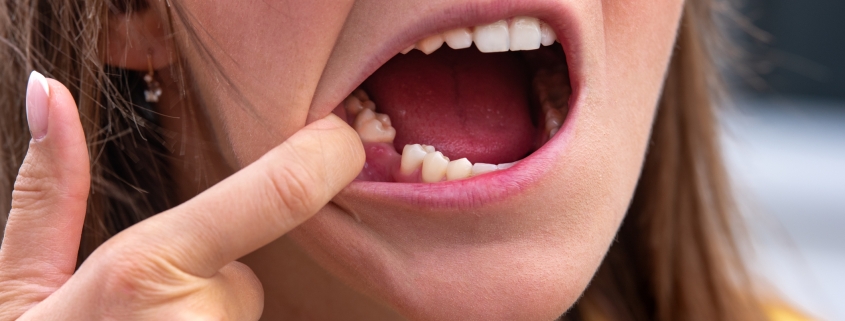Loosening of permanent teeth
Loosening of permanent teeth is usually a sign of redness for oral problems and should be addressed as soon as possible. There are many different types of oral diseases that can cause loose teeth.
Loose teeth, in addition to the problems they cause you in terms of biting and chewing food due to the misalignment of the teeth, also carry the risk of losing one or more teeth. Loose teeth are not a good sign, but they do not necessarily mean tooth loss. Therefore, if you suffer from this complication, see a professional dentist as soon as possible, because loose teeth can be a sign of more dangerous oral diseases that definitely need special treatment and care.
Causes and causes of permanent tooth loosening
Periodontal diseases
Periodontal disease not only affects your gums, but also the ligaments and bones that support your teeth. Periodontal disease is one of the most common causes of loose and displaced teeth.
Fortunately, periodontal disease can be easily prevented by maintaining good oral hygiene. Therefore, you should not let the severity of the disease reach a point where it causes the tooth to loosen. Maintaining good oral hygiene, including brushing and flossing properly and regularly visiting the dentist twice a year, are the most important points in preventing periodontal disease.
Pregnancy hormones
Elevated levels of the hormones progesterone and estrogen during pregnancy can cause the ligaments and bones around the teeth to become soft and loose, which can cause the teeth to loosen. Fortunately, this complication is usually temporary and will not lead to tooth loss unless there are other illnesses and complications, such as periodontal disease. However, do not take any risks and if you see the first signs of loose teeth during pregnancy, be sure to see your dentist and consult with him.
Osteoporosis
Osteoporosis can occur in both men and women. This condition causes the bone density throughout the body to decrease and the bones to become more vulnerable to fractures. When the bone density around the teeth decreases, it can cause the teeth to loosen.
Injuries and bruises
When a blow or force is applied to the teeth, the periodontal ligament and the connective tissue that hold the teeth in place may become stretched and damaged. Periodontal ligament strain can cause loose teeth. This happens when you regularly brush your teeth together at night while sleeping, or press your jaws together, or your upper and lower row teeth are not aligned and do not overlap regularly. Any injury to your mouth from a fall or injury in an accident can also damage the ligaments and bones around your teeth. Therefore, take injuries and blows to the mouth area seriously and see a dentist immediately to check your condition.
Signs and symptoms of permanent tooth loosening
People who have loose teeth usually have the following symptoms:
Discomfort when chewing food
Pain when moving teeth
Redness, swelling, and damage to the tissue around the loose tooth
Treatment of loose teeth
The method used to treat your loose teeth largely depends on the cause of the loose teeth. The first step in treating loose teeth is to provide extra support for your tooth to make it more stable. This process, called splinting, involves placing a small, flexible splint at a point that can prevent your teeth from moving. Using a special toothpaste, the dentist attaches this small splint to one side of your tooth and attaches it to the side teeth to fix and loosen the loose tooth. The splint usually stays in the mouth for about two weeks, during which time the periodontal ligaments heal. If your teeth are loose due to gnashing of teeth during sleep, your doctor will give you a special mouth guard to put it in your mouth at night while you sleep. This guard acts as a shock-absorbing cushion between your teeth, preventing the jaws from fully overlapping during sleep. If you are in the habit of grinding your teeth against each other, using this mouth guard will cause your teeth to move back and forth on the soft material in the guard, and as a result, tension will enter the periodontal ligaments and your teeth will loosen. Be prevented.

